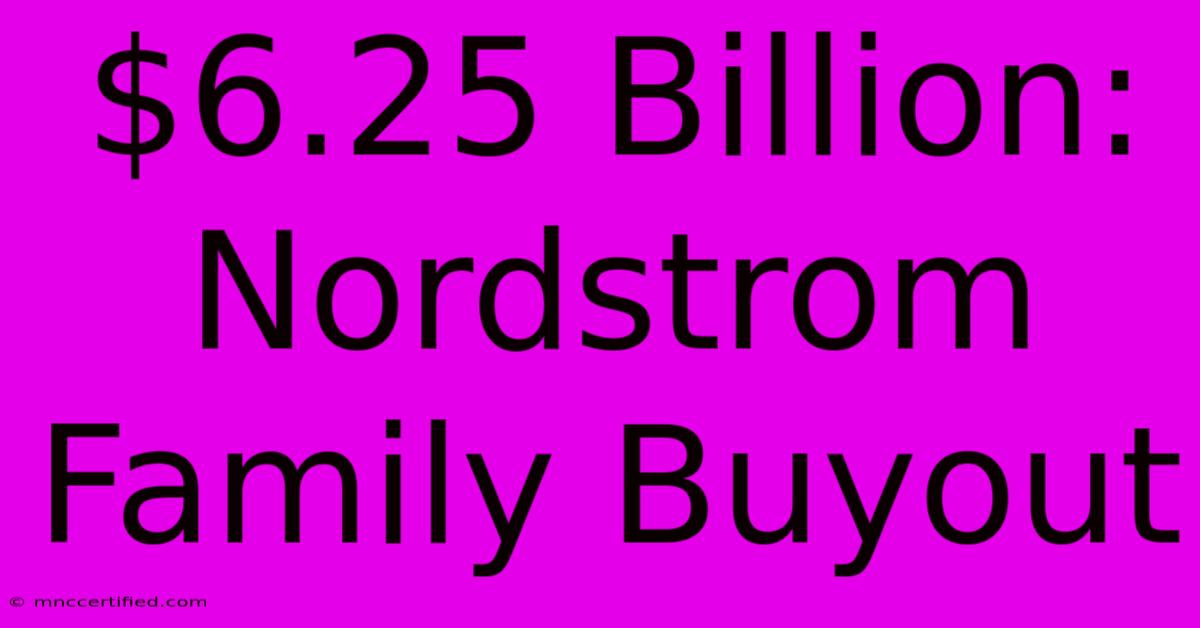$6.25 Billion: Nordstrom Family Buyout

Table of Contents
$6.25 Billion: Nordstrom Family Buyout – A Deep Dive into the Deal
The Nordstrom family's $6.25 billion buyout of the iconic department store chain represents a significant shift in the retail landscape and a fascinating case study in family business dynamics. This article delves into the intricacies of this monumental deal, exploring its implications for the company, the family, and the future of retail.
Why the Buyout? A Look at the Driving Forces
The decision for a family buyout wasn't impulsive. Several factors contributed to the Nordstrom family's move to take the company private:
-
Strategic Repositioning: For years, Nordstrom faced challenges from the rise of e-commerce and changing consumer preferences. Going private allows the family to implement long-term strategic changes without the pressures of quarterly earnings reports and Wall Street expectations. This could include significant investments in their online presence, supply chain optimization, and potentially even store closures or renovations.
-
Debt Financing: The buyout was largely financed through debt. This leverages the company's assets to fund the transaction, indicating a belief in Nordstrom's long-term potential for profitability. Managing this debt will be crucial to the success of the buyout.
-
Family Unity and Vision: The family's collective decision highlights a shared vision for Nordstrom's future. This unified approach contrasts with the sometimes-turbulent dynamics seen in other large family-run businesses. The family likely believes they can guide the company more effectively without external shareholder pressures.
Analyzing the $6.25 Billion Price Tag
The $6.25 billion price tag is substantial, reflecting the value placed on Nordstrom's brand recognition, real estate portfolio, and customer base. However, some analysts question whether this price represents fair value, particularly given the company's recent struggles. The deal's success hinges on the family's ability to improve profitability and justify the high purchase price.
Key Aspects of the Deal:
-
Valuation: The buyout price reflects a premium over the company's stock price before the announcement, signifying the family's confidence in the company's long-term prospects. Understanding the valuation methodology employed is crucial to assessing the deal's soundness.
-
Financing: A significant portion of the deal is financed through debt, adding risk. The ability of Nordstrom to manage this debt effectively is critical to long-term success.
Implications for Nordstrom: A New Era?
The buyout signifies a potential turning point for Nordstrom. The absence of public scrutiny could lead to bolder decisions regarding:
-
E-commerce Expansion: The family may invest heavily in enhancing its online presence to compete more effectively with online giants.
-
Store Optimization: This might involve closing underperforming stores, renovating existing ones, or exploring innovative retail concepts.
-
Brand Revitalization: The family may focus on repositioning Nordstrom's brand to attract a younger demographic and enhance its appeal to a broader market.
Risks and Challenges Ahead
Despite the potential benefits, the buyout isn't without risk. The family faces considerable challenges, including:
-
Debt Management: Successfully navigating the high debt burden acquired through the buyout is paramount.
-
Competition: The retail industry remains fiercely competitive. Nordstrom will need to constantly innovate to stay ahead.
-
Economic Uncertainty: Economic downturns can significantly impact luxury and department store sales.
The Future of Nordstrom: Predictions and Outlook
The Nordstrom family buyout represents a bold gamble. The success of this strategy depends on the family's ability to execute its vision effectively, manage debt responsibly, and navigate the ever-changing retail landscape. While the future remains uncertain, the family's deep-rooted connection to the brand and their collective commitment to its success offer a degree of optimism. Time will tell if this $6.25 billion investment will pay off.
Keywords: Nordstrom, Nordstrom family, buyout, $6.25 billion, department store, retail, family business, private equity, e-commerce, strategic repositioning, debt financing, valuation, risk, challenges, future outlook, retail industry, luxury retail.

Thank you for visiting our website wich cover about $6.25 Billion: Nordstrom Family Buyout. We hope the information provided has been useful to you. Feel free to contact us if you have any questions or need further assistance. See you next time and dont miss to bookmark.
Featured Posts
-
Matt Gaetz House Power Climb
Dec 24, 2024
-
Nordstrom Family Secures 6 25 B Takeover
Dec 24, 2024
-
Gaetz House Report Sexual Misconduct Details
Dec 24, 2024
-
Ny Murder Charge Woman Set Ablaze
Dec 24, 2024
-
Norad Santa Tracker Northeast Louisiana
Dec 24, 2024